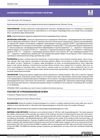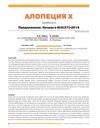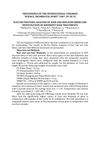 November 2024 in “Fizioterapevt (Physiotherapist)”
November 2024 in “Fizioterapevt (Physiotherapist)” High-intensity phototechnology, especially with other treatments, effectively improves quality of life for diffuse alopecia patients.
 October 2018 in “Vestnik dermatologii i venerologii”
October 2018 in “Vestnik dermatologii i venerologii” Certain growth factors affect hair loss in women and could be targeted for treatment.
[object Object]  January 2013 in “Российский журнал кожных и венерических болезней”
January 2013 in “Российский журнал кожных и венерических болезней” Androgenic alopecia, a common hair loss condition, is linked to changes in androgen metabolism and genetics, and can be treated with finasteride and minoxidil, but these treatments are only fully effective in 10% of patients.
August 2021 in “Consilium medicum” COVID-19 may worsen hair loss, but treatments like minoxidil can help.
 38 citations,
April 2018 in “Psychopharmacology/Psychopharmacologia”
38 citations,
April 2018 in “Psychopharmacology/Psychopharmacologia” Blocking CRF-R1 can reduce alcohol intake in stressed mice.
1 citations,
August 2021 in “Arhivʺ vnutrennej mediciny” Hormonal imbalances can cause hair loss, and understanding them can help develop better treatments.
 2 citations,
January 2018 in “Sovremennye problemy nauki i obrazovaniâ”
2 citations,
January 2018 in “Sovremennye problemy nauki i obrazovaniâ” Hirsutism and acanthosis nigricans are important for diagnosing PCOS; dermatologists play a key role in early detection and treatment.
 May 2023 in “Vestnik dermatologii i venerologii”
May 2023 in “Vestnik dermatologii i venerologii” Early-stage male pattern baldness shows two types of hair loss: one on the top of the head linked to hormonal changes, and another at the back of the head. The top hair loss responds well to specific treatment, while the back hair loss does not.
4 citations,
July 2019 in “Vestnik Rossiĭskoĭ akademii meditsinskikh nauk / Rossiĭskaia akademiia meditsinskikh nauk” Both genetics and lifestyle factors contribute to male pattern baldness.
 January 1993 in “Проблемы Эндокринологии”
January 1993 in “Проблемы Эндокринологии” Spironolactone effectively reduces symptoms of hyperandrogenism but has some side effects.
 August 2022 in “Sovremennye tehnologii v medicine”
August 2022 in “Sovremennye tehnologii v medicine” Barophoresis is a feasible and safe method for treating chronic generalized periodontitis.
 January 2024 in “Современные проблемы науки и образования (Modern Problems of Science and Education)”
January 2024 in “Современные проблемы науки и образования (Modern Problems of Science and Education)” Treating post-COVID hair loss leads to full recovery, while not treating it often results in ongoing symptoms.
 February 2023 in “Sibirskij onkologičeskij žurnal”
February 2023 in “Sibirskij onkologičeskij žurnal” Chemotherapy often causes hair loss in cancer patients, affecting their mental health, but scalp cooling can help prevent it.
 December 2020 in “Èffektivnaâ farmakoterapiâ”
December 2020 in “Èffektivnaâ farmakoterapiâ” Selenzin Peptide Active can effectively treat hair loss in postmenopausal women.
 1 citations,
May 2021 in “Problemy e̊ndokrinologii”
1 citations,
May 2021 in “Problemy e̊ndokrinologii” Androgen levels can increase at any age, affecting symptoms like acne, hair loss, and prostate size.
1 citations,
April 1993 in “Problemy e̊ndokrinologii” Spironolactone effectively reduces symptoms of hyperandrogenism like hirsutism and acne.
 March 2024 in “Vestnik Rossijskogo universiteta družby narodov. Seriâ Agronomiâ i životnovodstvo”
March 2024 in “Vestnik Rossijskogo universiteta družby narodov. Seriâ Agronomiâ i životnovodstvo” Wnt and Shh signaling are key in noggin-induced tumors, and blocking them can slow tumor growth.
 January 2024 in “Vestnik oftalʹmologii”
January 2024 in “Vestnik oftalʹmologii” Stopping minoxidil and using prostaglandin analogues improved the man's eye condition.
October 2020 in “Вестник СурГУ. Медицина” PRP can help regrow hair and improve hair density in people with androgenetic alopecia.
 December 2015 in “Вестник дерматологии и венерологии”
December 2015 in “Вестник дерматологии и венерологии” Men with male pattern baldness may not have different hormone levels, but their hair follicles are likely more sensitive to hormones.
 January 2015 in “VetPharma”
January 2015 in “VetPharma” Alopecia X causes hair loss in young plush-coated dogs and can be treated with various therapies, but hair may regrow and then fall out again.
 January 2013 in “Российский журнал кожных и венерических болезней”
January 2013 in “Российский журнал кожных и венерических болезней” Combining zinc hyaluronate electroporation with photostimulating therapy is more effective for treating hair loss in men and women.
July 2020 in “Vestnik urologii” The cause of post-finasteride syndrome is unclear and needs more research.
January 2015 in “Современные проблемы науки и образования” Phytochemicals in hair masks can help with damaged hair, seborrhea, and hair loss.
 October 2023 in “European journal of dermatology/EJD. European journal of dermatology”
October 2023 in “European journal of dermatology/EJD. European journal of dermatology” Injectable platelet-rich fibrin can safely and effectively treat melasma.
1 citations,
November 2021 in “Translational pediatrics” Glucocorticoids for progressive muscular dystrophy in children don't improve muscle strength or function but do increase certain side effects.
 26 citations,
June 2020 in “Polymers”
26 citations,
June 2020 in “Polymers” Microneedle made of iron oxide and PVA helps hair regrowth in alopecia treatment.
[object Object]  May 2024 in “Lasers in medical science”
May 2024 in “Lasers in medical science” The 2940-nm Er: YAG laser combined with medication is a safe and better treatment for male hair loss than medication alone.
February 2024 in “Cosmetics” The conclusion is that new plant-based treatments for hair loss may work by targeting certain enzymes.

Hair properties change under electromagnetic fields and are influenced by individual characteristics and the environment.





















